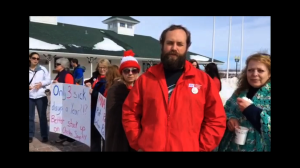

Ask a Travel Nurse: Can I ask for flight reimbursement to get to my assignment?
Ask a Travel Nurse Question:
I plan on taking my first travel assignment this summer and I’m looking for a company to cover airfare from Georgia to California and to offer great housing that’s safe and close to work.
I’m interested in San Francisco or the Bay area and I know I may need to rent a car, however, if I can get away with only weekend rentals for exploring, then I’m good.
How feasible is it that I would get my little wish list of flight reimbursement and safe housing near work?
Ask a Travel Nurse Question:
Although traveling cross-country can be a great adventure, it’s not for everyone. But when traveling great distances, it’s no different than any other assignment as far as travel reimbursement goes.
Most companies pay a travel allowance to and from the facility (usually $200-$300). If you are not flying at peak times, you may certainly be able to find airfare that will fit into a one-way ticket at this price (on June 11th for example, Southwest has fares under $300 from Atlanta to San Diego). Up to the Bay Area may be more, but everything in your contract is negotiable and if you want to push for more travel reimbursement, then just ask. But remember that travel expenses are likely something that you can deduct on your taxes whereas taking money from other areas of your contract allocation may not yield any ability to recoup those costs.
As far as having a rental car, you can find companies that provide this, but nothing in life is free and you will also find that money allocated from another portion of your contract (most likely resulting in a lower hourly pay rate).
If you are in larger cities, you may need to look into mass transit instead of rental cars. However, if you are talking about working in the city of San Francisco, then you may be able to have your travel company find you a place close enough to walk to work. When I worked UCSF, my company provided me a one bedroom place that was a fifteen minute walk to work and even came with a parking spot since I chose to drive out from Ohio (something that’s usually a premium in SF housing).
For the times when you absolutely need a car, try Zipcar (zipcar.com) which allows you to rent cars for as little as a few hours.
In finding safe housing, many companies do this, but some are better at it than others. I tend to avoid any company that wants to put me up in an extended stay hotel, but if it meets your needs, so be it. Otherwise, insist on a one bedroom apartment and keep in contact with the company’s housing coordinator making sure they understand that you want to have an address before leaving for your assignment.
Once you have the address and the complex info, you can look up the place on the Internet and see what the neighborhood is like, the amenities, etc. I also always call the complex myself and make sure they are expecting me on the date I will arrive, a tentative lease is in place, and the address is correct.
Northern California is presently paying pretty good with some “crisis” needs depending on travel company and the facility. However, in these “cash cow” positions, you WILL work for your money. Also be sure you understand if your contract is for a specific unit or you will be required to float between units and possibly even facilities.
Your “wish list” is actually in line with what the better companies should be willing to provide for what is really a standard expectation of a trip so far across the U.S.
I don’t know what they are currently paying for SF assignments, but if you would like to take a look at the company with which I traveled to SF, feel free to email me at david@travelnursesbible.com and I can hook you up with a great recruiter there. You may not be the highest paid traveler working through them, but I trust them to offer a safe experience, in good housing, for your first long distance travel assignment.
Hope this helps 
David
david@travelnursesbible.com

 10 and at Grand Itasca on June 12.
10 and at Grand Itasca on June 12.

